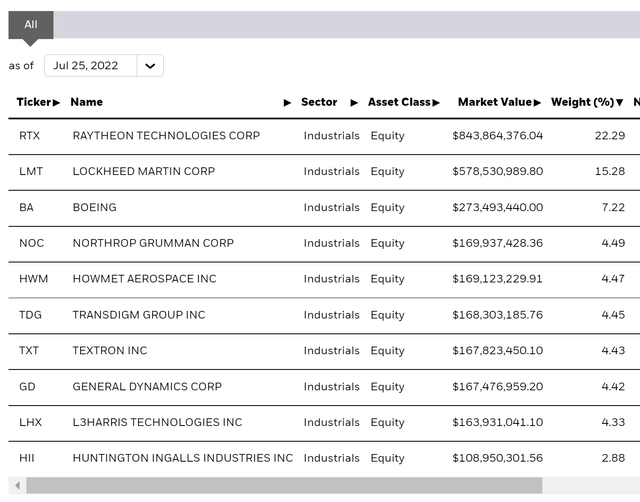
bfk92/E+ via Getty Images
Published on the Value Lab 26/7/22
US defense companies are among the world’s enterprises that must be most respected for technical discipline and ingenuity. With the military being a very discerning customer (for the most part), and much of their work happening under the covers, they don’t often have public problems. However, it seems that even defense contractors are not going to escape the broad effects of supply chain issues. In this case, labour is the primary culprit, but other materials worry us as well, and all of that can dampen expectations for the iShares U.S. Aerospace & Defense ETF (BATS:ITA) constituents.
ITA Breakdown
With the ITA ETF being a broad way to expose one’s portfolio to defense, let’s focus on how it breaks down and where some of the problem areas might arise as supply issues start affecting defense. The biggest holding at a 22% weighting is Raytheon (RTX). They were the first to start disappointing defense investors with bad news. The main issue they say is with finding skilled labour, but most of their segments, including their vaunted missile segment, struggles to pump out growth with guidance declining.

ITA Breakdown (iShares.com)
One of our really excellent calls all the way back in February was the issue of titanium supplies.
There are risks to Dassault, like the fact that Safran, its engine producer, is exposed to Titanium shortage risk in relation to Russia sanctions.
Sure enough, with Russia being the home to a plurality of the world’s titanium, guess what has happened? Titanium has begun to be a bottleneck for RTX. If it’s becoming an issue for them, it will be way worse for any company that manufactures airframes. Looking at the second member of the list, we have Lockheed Martin (LMT) at 15% which does just that. F-35s likely use a lot of titanium, and those deliveries might slow already next quarter when titanium almost inevitably becomes a limiter on production. There will be no way to skimp on it either, which is where being a defense contractor with 7-sigma requirements starts to bite back.
Conclusions
Titanium starts to become an issue for the next 3 or 4 holdings down the list which together account for another 15% or so. Boeing (BA) has different markets and has declined a lot this year while the rest of the market grew. If anything, they might have something to offer in terms of capital appreciation. But already TransDigm (TDG) which makes drones will run into similar issue. Supply chain issues are beginning to rear their head across the defense segment and are essentially sure to become a surprise in the next quarter for maybe 50% of ITA’s holdings. While being a strategic industry, there is nothing that even the US government can do about things not existing when they need to, both labour and key materials.
Does that mean you shouldn’t buy? Defense is clearly still a healthy industry from a demand environment, and while disposable income declines could cause pent-up demand to evaporate in consumer facing industries, this is not so for defense where there are willing governments dead set on growing defense capabilities. But still, with defense having been one of the few areas in the market to perform this year, this is something that could start breaking that market segment’s back. We’ve sold out of Dassault Aviation (OTCPK:DUAVF) which rocketed our returns this year after the mid-June collapse, and that stock hasn’t recovered. With things on more aggressive sale in current markets, maybe investors should look away from defense and ETFs like ITA to get their equity risk elsewhere.
While we don’t often do macroeconomic opinions, we do occasionally on our marketplace service here on Seeking Alpha, The Value Lab. We focus on long-only value ideas, where we try to find international mispriced equities and target a portfolio yield of about 4%. We’ve done really well for ourselves over the last 5 years, but it took getting our hands dirty in international markets. If you are a value-investor, serious about protecting your wealth, us at the Value Lab might be of inspiration. Give our no-strings-attached free trial a try to see if it’s for you.



Be the first to comment